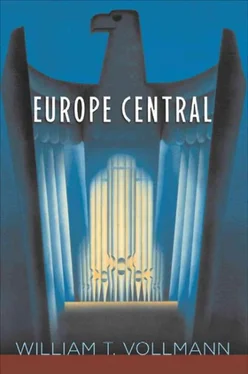2
We read that Krupskaya was first (that is, before her parable is supposed to begin) a pious little girl who prayed to the icon in her bedroom, then a rapturous Tolstoyan. In company with her friends she attacked a wealthy factory owner with snowballs. We find her cutting hay to help hostile and uncomprehending peasants at age fifteen, then teaching night classes in literacy to factory workers at twenty-two. She was one of those souls who long more than anything to be of use in this world. Unknowingly she found herself drawn to the letter Cheth, which resembles the Greek letter pi and which, thus visually representing a gate, refers to ownership. She yearned to give herself, to be possessed, to know where she stood.
By the time she was twenty-six, she was receiving, materializing and carrying to underground printers the invisible-inked manifestoes which Lenin sent from prison. The legend says that one of her greatest joys was to watch the magic letters appear in the boiling water, as if they comprised a secret message written expressly for her, instead of being merely another metallically impersonal appeal to the workers. (After all, reader, don’t you prefer to believe that this story which you’re taking the trouble to read has something to say to you?) But for just the same reason that she shunned fashionable clothes, chocolates and other frivolous pleasures, Krupskaya strove to persuade herself that in the self-abnegation of transcription lay her destiny.
When she reached the age of twenty-seven, N. K. Krupskaya was arrested for the first time. After two months in preliminary detention, they released her, thinking her to be a shy nobody who’d gotten mixed up in illegal activity only by mistake, but so brazen and exalted were her actions on behalf of the Kostroma strikers that she was arrested again after only eighteen days.
Here again I seem to see that pallid, protuberant-featured Social Revolutionary woman who sought to kill Lenin. It’s said that Fanya Kaplan had already become a committed anarcho-terrorist by the time she was sixteen. When the gendarmes burst in, she and her comrades were arrayed around the bed, carefully assembling the components of a bomb, like those Kabbalists who in their circle-beset diagrams arrange into bristling molecules the various emanations and manifestations of God. It’s even said that the police themselves were moved by the perfection of the urchin-spined grey spheres laid out upon the young girl’s white sheets. Fearing for the Tsar’s safety, the court at first condemned her to death, but in view of her youth and sex the sentence was commuted to hard labor for life in Siberia. There she dwelled between the river-ice and the celestial alphabets of constellations until the October Revolution amnestied her. By then Fanya Kaplan was more determined than ever to redeem all Russia from centralist abomination.
As for Comrade Krupskaya, who proved equally unrepentant, they kept her in the blankness of the cells for five months, until a convict named M. F. Vetrova burned herself to death to protest her own fate. So in garments of flame this woman (otherwise almost unknown) dictated her tale of righteousness. Who says that tales are only words? Embarrassed by Vetrova’s propaganda triumph, the authorities felt compelled to exercise upon their remaining female prisoners the same leniency which they would grant Fanya Kaplan. In March of 1897, not long after her twenty-eighth birthday, they freed Krupskaya on grounds of failing health. (Fanya Kaplan for her part was also twenty-eight when she was freed forever by Malkov’s bullets.)
A photograph from this period reveals Krupskaya’s pale, stern beauty. Her smooth forehead glows like winter sunshine on a snowy field, her clenched lips cannot entirely deny their own sensuousness, and her eyes gaze with painful sincerity into the ideal—dark eyes these, longing eyes from which a craving for meaning steadfastly bleeds. Her high and proper collar hides her almost to the chin, so she’s but a face, closed but promising something, like a flower-bud. She’s combed her hair severely back, and cropped it short; she’s a recruit, a fighter, a militant.
3
Knowing that Lenin needed a copyist in his Siberian exile, and learning that she too would be exiled (the police themselves being not entirely illiterate readers of dangerousness), she accepted her leader’s proposal for a marriage of convenience, replying in those famous words, meant to show her imperviousness to bourgeois institutions: Well, so what. If as a wife, then as a wife. —In fact there is every reason to believe that beneath this bravado lived an idolatrous passion.—Upon her arrival the following year, when Fanya Kaplan was celebrating her tenth birthday, the reunited atheists submitted to a full church wedding in Shushenskoe, which is wistfully called “the Siberian Italy.”
The law required an exchange of rings; and devotees of that most Kabbalistic genre, the parable-within-a-parable, might well concentrate on this most pathetic episode of the ceremony, unable to resist dissecting the ironic symbolism of those two copper wedding bands lying side by side on the black velvet cushion. 2 2 Exegesis easily uncovers other ironies: The purple-cloaked priest, it is written, was as exasperated as his victims, because this marriage prevented him from renting the extra room of Lenin’s house which the bride and her mother would now occupy. (Had she remained unmarried, Krupskaya would have been remanded to the locality of Ufa.) And perhaps he scented the godlessness of the convict spouses. What must he have made of Krupskaya’s abashedness, Lenin’s sarcastic smiles? How might he have proceeded, had he understood that this church of his, by sealing the union of these two helpmeets, was hastening its own destruction, and his?
It’s said that when the eternally virginal Krupskaya first saw them, she blushed. Freshly worked copper has a peculiar brightness, like bloody gold. We need not detain ourselves here with mystic correlations and analogies, God being ineffable anyway; it seems that the raw luminosity of the rings exposed her unacknowledged feelings in their revelatory glare. They’d been fashioned by a Finnish comrade who was still learning the jeweler’s craft—indeed, he was indebted to Krupskaya for his tools, so he’d taken special pains, inscribing them with the names of the bride and groom in characters which in their squat angularity might well have graced some seventeenth-century diagram of astrology’s nested spheres. In their shape the rings are said to have resembled the letter Samekh— a sort of o which tapers as it rejoins its starting point, and which sports a tiny bud on top, imagined by dreamy brides to be a precious stone. Need I add that this character of the mystical alphabet symbolizes both help and sleep ? (Recall Marx’s ambiguous proverb: Religion is the opium of the masses.)
Who knows the fate of those shining circlets? The ring which Krupskaya slipped upon Lenin’s finger was never seen again. As for the one he slid onto hers, she removed it immediately, for the sake of revolutionary convention. Then the ceremony was over, and they walked home by separate ways.
So she became both drudge and disciple, the good soldier, the bedfellow (or occasional bedfellow as I should say, for in their Kremlin suite each spouse had a private room and a single-width metal-framed bed 3 3 Upon his own escape from Siberia to England in 1902, Trotsky had likewise found them working in separate quarters. “Nadyezhda Konstantinovna Krupskaya… was at the very centre of all the organization work,” he writes in his memoirs. “In her room there was always a smell of burned paper from the secret letters she heated over the fire to read.”
), the harmless mediocrity, the liquidator of pessimism, the amateur who transcribed Lenin’s essays and sewed his nightshirts. (That German Communist Clara Zetkin, more glamorous than Krupskaya by far, visited the happy couple before and after the Revolution; her memoirs indulgently commend the wife’s “frankness, simplicity and rather puritanic modesty.”)
Читать дальше












